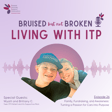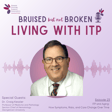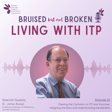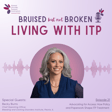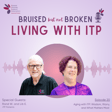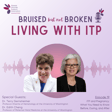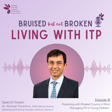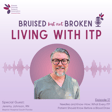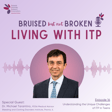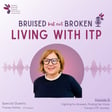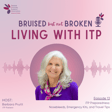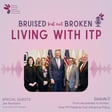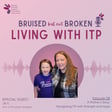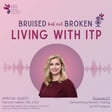Introduction to ITP Podcast
00:00:00
Speaker
I would encourage everybody to ask their hematologist about research and ITP and whether there's a clinical trial that they might be eligible for, what kind of clinical trials are open in their age group or their type of ITP.
00:00:16
Speaker
I think that it's incredible what's been accomplished already, and i think it's exciting what we're going to see over the next five to ten years.
00:00:27
Speaker
Welcome to the PDSA podcast, Bruised But Not Broken, Living with ITP. The diagnosis of a bleeding disorder like immune thrombocytopenia may leave you wondering, how can I really live my life with ITP?
00:00:40
Speaker
PDSA's podcast, Bruised But Not Broken, Living with ITP, brings empowering stories, the latest research and treatment updates, lifestyle tips, and answers to the real-life questions the ITP community is asking.
Guest Introduction: Dr. Rachel Grace
00:00:55
Speaker
Here's your host for this episode, Barbara Pruitt. Hi, good afternoon, good morning, wherever are. topic is really that you've probably heard about. We're going to go over clinical trials. And morning wherever you are today's topic is really one that you've probably heard about we're going to go over clinical trials and If your hematologist has mentioned clinical trials to you, today we're going to get the answers about what they're all about, and we've got an expert on that.
00:01:28
Speaker
Today we have, as our guest, Dr. Rachel Grace. She's a pediatric hematologist at Boston Children's Hospital. She's an associate professor of pediatrics at Harvard Medical School, and she is the medical director of the Hematology Clinical Research Program at Boston's Children's Hospital.
00:01:50
Speaker
She enjoys the clinical care of pediatric patients, and her interests are on focusing on improving the outcomes and the care and treatment of individuals that have immune cytopenias.
00:02:06
Speaker
And to top it off, she is also a member of the PDSA Medical Advisory Board. So we want to welcome you today, Dr. Grace. Thank you so much for joining us.
00:02:18
Speaker
Thank you so much for having me. This is a treat because I know personally I've been and a couple clinical trials and i still have questions.
00:02:29
Speaker
So I know that people out there who are you know considering a clinical trial or asking questions about it, this will be a great topic for them today.
Understanding Clinical Trials
00:02:41
Speaker
So when people hear the term clinical trial, they don't really know what it means. So could you explain that to us?
00:02:49
Speaker
And how is it different from your standard medical care? Sure. Well, clinical research in general is the study of health and illness in people. And a clinical trial is an example of a type of clinical research.
00:03:04
Speaker
In a clinical trial, a specific test or treatment is being studied to see if the intervention helps to prevent or to treat a condition. And in a clinical trial, volunteers give their permission or their consent to have a treatment to study if it's safe or ineffective.
00:03:22
Speaker
An example would be an interventional clinical trial for a drug that's being studied to see if it's safe and effective in ITP. And years of research lead to a clinical trial, so a lot of data is already known before a drug is ever given to people who have a condition as part of a clinical trial.
00:03:39
Speaker
And strict rules and monitoring are in place for the oversight of clinical research and clinical trials. And it is really important to understand how research is different from standard medical treatments and what's involved in participating in a research study.
00:03:55
Speaker
And I can highlight a few of these differences. So, one difference is in terms of the intent of the of the treatment. So, in medical treatment and routine care, you're addressing the needs of an and individual person and the intent is to treat that individual person um But in clinical research, the ah the intent is really to answer a research question through through volunteers. And the intent really is to to help people in the future. The hope is that as as part of the trial that you're helping the person who's in the trial, the volunteer, but the intent is really to benefit future people.
00:04:30
Speaker
So it's not just for that end of individual person, it's for the benefit of the whole ITP community when we're when we're talking specifically about ITP clinical trials.
Dr. Grace's Journey in Research
00:04:42
Speaker
So what what got you interested in even participating in clinical trials? I had an interest in clinical research before I ever went to medical school. when um When I was learning about the different sciences as an undergraduate, it's natural to ask a lot of questions. And it was surprising to me that so many of the questions couldn't be answered.
00:05:05
Speaker
And so I got involved in research even as an undergraduate. And then when I went to to do my pediatrics residency, and then beyond that as a pediatric hematology oncology fellow,
00:05:16
Speaker
I started to meet patients and families affected by ITP, and I was surprised by how so many of the questions that the families had and that I had couldn't be answered in terms of which patients ITP was likely to self-resolve and when was it going to self-resolve, who was going to have bleeding symptoms in the future, which treatments were going to work for individual patients.
00:05:40
Speaker
And it was getting involved with these families that got me interested in clinical research in ITP and immune cytopenias in particular. And during my fellowship and now, you know, for years, have been involved in in different forms of clinical research and clinical trials looking to see what new medications might be helpful for people with ITP, but also running and being a part of other types of clinical research, observational studies, and like registries and survey studies that help us to learn a lot about ITP as well.
00:06:13
Speaker
Well, that's great. That's a lot of information, and I'm glad you're one of those curious people that really delve into this because those great minds are the ones that are going to form the answers, and the clinical trials are an integral part of that.
Deciding on Clinical Trials
00:06:28
Speaker
um When you have a patient, I know yours are pediatric patients, but for also adult patients, at what point would you suggest to them that they might consider a clinical trial?
00:06:42
Speaker
I know I keep bringing it back to clinical research in addition to clinical trials, but that's partially because I think there's so much to learn even outside of clinical trials. In our clinic, as I think in in many academic clinics, parts of hospitals that are part of training institutions and in medical schools, we offer research to every family that comes who has ITP. So that's a part of our routine practice because we hope to have something available for everybody because we think there's opportunity to learn from everybody.
00:07:12
Speaker
if they're willing to participate. For clinical trials in particular, so for thinking about people who might be good candidates for an intervention, a new drug trial, i think part of it is people who haven't had success with treatments that they've tried in the past where either they've not tolerated prior treatments or they've not had a good response, a platelet response or bleeding response to prior treatments, especially people who've tried a number of different treatments in the past,
00:07:41
Speaker
Those individuals who still have symptoms and manifestations of ITP where it's affecting their everyday quality of life, those are people where we would be talking about what's possible in a clinical trial and what open trials might be ones that they should think about.
00:07:57
Speaker
There are are people who are really interested in helping to further medical knowledge, you know, that are invested in that and want to try something new, um even if they've had something that's been effective for them, but are interested for a variety of reasons in trying something new.
00:08:12
Speaker
And I think too, there are things that stand in the way of routine medical care, like the cost of care. So for some people, unfortunately, they have access to some treatments, but not other treatments. And having a clinical trial makes you know potential new drugs accessible to some people where maybe they don't find accessibility to other treatments.
00:08:33
Speaker
It also allows for the costs of that care to be paid for by research. So rather than having to pay for your own care or you having your insurance or payer coverage cover the care, the cost of the treatment, the cost of the monitoring, the cost of all those visits is paid for by the research.
00:08:52
Speaker
For some people, that's a major benefit because they don't have the type of coverage that they wish they had for treatment. Right. Well, to specify, clinical research is really like answering questionnaires and surveys, registries, and a clinical trial has to do with an intervention.
Role of Observational Data
00:09:12
Speaker
That's right. That's where the two separate between... the research studies, and then then the actual medication that they're trying out. I would say too that clinical research is like the big category and clinical trials is a type of clinical research and the surveys and the registries are what are called observational. So there's observational studies and interventional studies. The interventional studies tend to be those clinical trials where people are trying a new drug and the observational studies are the ah surveys or registries that
00:09:46
Speaker
But i I think that people sometimes don't realize how important those observational studies are. And a lot of the ways that we practice come from observational studies, so you know, and in terms of knowing the frequency of bleeding symptoms and what populations of people with ITP might be observed versus requiring a treatment or even our testing and and monitoring approach, you know, which types of tests should we be sending in people who have ITP?
00:10:15
Speaker
And what do we do with the different results? An example of that, if I can share an example. Sure. The Sarah Vance group in France have really great observational data about people with ITP. And in their study, when they looked at the time when somebody first came in with an immune low blood cell count, they checked a test called an anti-nuclear antibody, an ANA test.
00:10:39
Speaker
And if that test showed a high positive rate, a significant percentage of young people went on to develop lupus, a more systemic autoimmune problem. And what they saw also in their data is that if people had that high positive test and started on a medicine called hydroxychloroquine,
00:10:59
Speaker
that that significantly reduced the rate that people who had ITP went on to develop lupus. wow So that was all observational data recognizing maybe we should be sending this test in certain people and maybe we should intervene based on the results.
00:11:14
Speaker
So that was without, you know, without an intervention, all observational. So it's an association without knowing what causes what. But that association is important to know about. And we can't always do interventional trials around everything because they're expensive and hard to conduct. And so this observational data can be really strong and helpful in terms of keeping people healthy.
00:11:38
Speaker
And that collected data is so important. And that's why, like the PDSA has their natural registry for ITP patients. And we really encourage all patients to go online and fill that out as much as they can because that information is so valuable.
Addressing Clinical Trial Concerns
00:11:56
Speaker
If you are telling or asking someone to participate in a clinical trial, meaning having an intervention of some sort, What are the concerns and hesitations that you see in your patients or the patient's parents in your your case I think people have a lot of reservations sometimes about research.
00:12:19
Speaker
One is, you know, people don't want to feel like they're part of an experiment. People say, oh, I don't want to be a guinea pig or something like that. And I think talking about, well, what do we know about the type of trial we're talking about? Where does the data come from about why we think this medication might be effective in ITP?
00:12:38
Speaker
And you all we know about the safety and the types of studies that are done before you get to the trial. So I think having that information is ah extremely helpful. Another reservation is around privacy. So people worry about having their medical information somehow known to ah company because a lot of the interventional trials are run, are sponsored and designed by pharmaceutical companies. They're run oftentimes with a clinical research organization, the middleman in the in the middle, and then they're conducted at the hospital with hematologists. So they're worried about other people having their medical information.
00:13:16
Speaker
And it's important to know that everybody who participates in a study is assigned a complex study ID, and their information is what we call de-identified. It's not associated with their private information information.
00:13:30
Speaker
so that the information is collected but nobody knows that it's that individual person except for the people who are at the site. And that informed consent form, that process of getting permission, volunteering to participate really goes through who has any of your health information and who can see it so that you have all those details so that you can be informed as to you know who has any of your private information.
00:13:56
Speaker
And then I think people are you know worried sometimes about the time that it takes to participate in a clinical trial, that it's not the same as routine medical care, that you need to come to specific visits on specific days and have certain tests done, that when you have routine medical care, you there's a little bit of a negotiation with your clinician about deciding, well, when do you really need to get blood work done? When do you need to come back for an in-person visit or a virtual visit? But with a research study, it's really like following a recipe. You have to do exactly what it says.
00:14:26
Speaker
And that can take time away from work or school or other commitments that you have. And so you have to feel invested in taking that time. The flip side of that is you get really, truly excellent care as part of your clinical research, clinical trial participation, that um you have a huge team of providers that are looking out for you bigger than part of your routine medical care because you have research nurse and a research coordinator and a hematologist and others who are wanting to know all your symptoms, any medical issues that come up, want to see you regularly, test you regularly, so you have very attentive care um while you participate in a clinical trial.
00:15:03
Speaker
Well, I have to agree with that because I've participated in a couple of clinical trials and um you're absolutely right. You get such great medical care because the doctor's really focused on you and how you're responding and and if you have any side effects. And then the research coordinator in the office is asking you a ton of questions, going over absolutely everything, things you wouldn't even think of.
00:15:28
Speaker
but it's all information that's gathered that really benefits in the long run to see whether this intervention is a good one and working or not. One thing I think that a patient might be concerned about or a parent of a patient is the cost of a clinical trial.
Costs and Motivations in Trials
00:15:45
Speaker
Could you explain how that works? Because I know there's no cost for them to participate, but it does take a lot of energy. Part of being the physician that's running it, and then there's additional staff and the clinical coordinator.
00:16:01
Speaker
How is all that expense shared? How does how is that handle? I think there are lots of different ways of looking at the cost. I mean, I think the way that I try to think a about it is, you know, there's cost to the patient, the participant.
00:16:16
Speaker
As you were just saying, the cost for all of the study drug, for the visits, for the monitoring, that's all paid for by the research study. From the patient perspective, there's the cost of missing work or missing school or other commitments.
00:16:31
Speaker
And that cost isn't really taken care of as part of the study. So I think that, you know, we think about the financial impact just in terms of the you know, the the medical care and that's paid for, but there is an impact in terms of what you might have to miss in order to participate. And I think everybody who designs a study tries to be really cognizant of that and tries to decrease the impact of that as as much as possible. And you are right, though, there's, you know, a lot that goes on on the medical end at the hospital.
00:16:59
Speaker
um in terms of how do you conduct a study and how do you pay for all of that. And that it's in a very complex system, but there are lots of different ways that this gets paid for depending on the type of study it is. So if it's a pharmaceutical company that's designed a study and is sponsoring a study, then they'll pay for the costs with a budget before the study ever opens to support the research nurse and the coordinator and the team that's needed to conduct the study and to pay for ah the lab tests and the room and everything of how the study needs to be conducted.
00:17:34
Speaker
If it's not with a pharmaceutical company, then we look to government agencies research funding or philanthropic funding or patient group funding to help support studies. And I think what questions get asked by pharmaceutical companies are sometimes different than the questions that we want to answer in clinical practice.
00:17:54
Speaker
For example, the clinical trials that are run by pharmaceutical companies often compare a drug to placebo. And the placebo is there because the regulatory agencies want to know about the side effects of the drug versus the side effects we see in somebody who's not getting the drug that might be from the condition.
00:18:13
Speaker
And we want to see too, if there's improvement in people getting the drug compared to the natural improvement, we might see in people who aren't getting the drug who have the condition. But in real practice, we're not thinking like, oh, in this individual person, should we give them a medication or should we observe them and not give a medication? Usually we're thinking, should we give somebody this medication or another medication or another medication? We're sort of looking to compare across them.
00:18:36
Speaker
And those kinds of studies have been rare in ITP because they're not the kinds of studies that pharmaceutical companies are interested in. So I think it's important to have funding from lots of different places so that we can try to answer all the important questions in ITP.
00:18:50
Speaker
Well, it's important for the patient to know that it's not going to be a financial burden on them specifically. And it sounds like they do try to accommodate the patient as far as missing work or whatever, try to be a bit flexible.
00:19:04
Speaker
One of the things that I recall from being in clinical trials is that, number one, I've never been pushed into it. It's always been explained from a to Z,
00:19:17
Speaker
Every question I had which was answered completely, even if I asked it twice or three times. um It is completely voluntary, and you can withdraw at any time if you're feeling uncomfortable.
00:19:29
Speaker
My feeling towards going into it was, hey, listen, nothing's worked so far. Maybe this will be the answer. Maybe this will work for me. But if it doesn't work for me, if it helps the ITP community in some way, i think it's worth it.
00:19:46
Speaker
So I know that's kind of an altruistic attitude, but I think the people that are involved and and decide to do that, they have a bit of that with them, don't you think?
00:19:56
Speaker
I do. I definitely do. As you're saying, it's always a choice and it's important to feel you've had ample opportunity to think about whether you want to participate, to have had the time to talk with other people, other providers, family, friends,
00:20:11
Speaker
about participating. you should never feel rushed into a decision about participating, and you can always change your mind and come off the trial even after you've started on it.
00:20:23
Speaker
It's always a choice, and that process of being informed about the trial, that consent process, it's an ongoing process. So even You know, you review it, you review this form, you go through all the information. You might go through it a lot of times and and go through all your questions. But even after maybe you've signed it and you're participating and you're on the trial, if new information comes along, you're going to be updated about that new information. a new ands consent form is going to be reviewed with you and you're going to go over that and the new information and the older information all over again. And your permission is going to be asked for again. Do you want to participate anytime there's no information? So it's really an ongoing process that happens the whole time that you're on a study.
00:21:04
Speaker
agree with you too, that it's it's an altruistic ah decision because it is something that may benefit you, but really the hope is to benefit people in the future and other people who have ITP.
00:21:16
Speaker
Right. And I know for myself, it was not presented in one day that they needed an answer. They gave me information. i could think about it. We talked about it a second time, might have visited. And, you know, it was a while before I said, okay, let's go ahead and try.
00:21:32
Speaker
And again, it's nothing that's forced on you, which I think is important to remember. And one of the things that made me feel comfortable was knowing all of the steps that this clinical trial went through before it was at the point where they were giving it to actual patients.
00:21:51
Speaker
Could you explain a little bit about how all these rules and regulations are put in place to protect the patient?
Phases and Oversight of Trials
00:21:59
Speaker
Sure. There are lots of ways of thinking about it. One is in terms of the different phases of a clinical trial, even you know the data that you need in order to get to a clinical trial that's actually in people who have a condition.
00:22:11
Speaker
So there's work that's done in the lab before ever getting to people. That's called preclinical work. And that's done in in test tubes, but sometimes done in animal models too, and trying to figure out both whether the drug is effective and if it's safe too.
00:22:27
Speaker
And then sometimes it will move to a different phase trial called a phase one trial where a drug is given to healthy people really to look at what the right dose might be in terms of safety, not looking to see if it's effective, but really looking at purely at safety And after that, then the drug might get to people in a phase two or three trial.
00:22:49
Speaker
And there are lots of steps, as you said, that go into place to make sure that there's oversight and that the drug trial has been ah designed with rigor. One initial part of that is going through the Institutional Review Board or Ethics Committee at each institution where the study is open. So that's a process of explaining all of the aspects of the protocol and the trial to a committee of people whose job it is to oversee the conduct of research at that institution. And that has to happen at every hospital where that study is open all over the world. Each place has a different process, but following the same principles.
00:23:29
Speaker
There are also, as part of drug trials, what's called a data safety and monitoring board or committee. That committee is a group of statisticians and and clinicians who meet and review the data separate from the trial. They're not involved in any other way. They're not part of a company. They're not part of the hospitals conducting the study.
00:23:49
Speaker
And they review the data periodically while the trial is being conducted to make sure they're not seeing safety signals of a problem. with the study drug, and they ask critical questions of the people conducting the study to make sure everybody's looking at all of the data carefully along the way and that the study is stopped if it's not safe or if there are other reasons to stop the study. And then there's regulatory agencies that oversee our trials too, like the FDA um in the U.S. to make sure that the conduct of the trial is following the important regulations.
00:24:22
Speaker
Well, that's great. That should be a relief for a person who's considering it too. That if there's a side effect that's showing up elsewhere and they want to stop the study, you're going to know that because that information is being collected Constantly, I'm assuming, correct?
Importance of Diverse Participation
00:24:40
Speaker
That's right. Constantly collected and constantly being entered into a database that's de-identified, has that number associated with each person, so nobody knows who who anybody is. And each site um enters the data and it goes to a central location where they're looking at it periodically.
00:24:57
Speaker
to make sure that they're not seeing safety signals. The other thing that happens too as part of trials is if there's a safety event, there's a big report that gets filled out by the site around that safety event and that report gets disseminated to every other site that's conducting the trial. So you know in real time about any important safety signals even before anything might get changed with a protocol or the consent form.
00:25:20
Speaker
The person who's leading the study at that hospital site knows about that safety issue. One thing i was thinking about as you're speaking is the hospital site. Clinical trials can also be performed at clinics, correct?
00:25:36
Speaker
I mean, they don't have to be necessarily always at a hospital or medical school. They're also open to like ah large hematology practices also.
00:25:47
Speaker
Yes. So and it just needs to be a place where they have all of the components needed in order to run the study. But as long as all those components are there, that's right. There are lots of different kinds of clinic and hospital settings that a clinical trial it can be run in.
00:26:02
Speaker
Well, and one thing I know that I've heard through the years is it's really important that people of all ages, races, backgrounds participate in research.
00:26:16
Speaker
Because ITP does not specify who is going to get it. So you really need to have a broader base of people participating in clinical research. How do you hope to overcome that issue?
00:26:33
Speaker
i think you talk about research with everybody who comes to everybody's clinic. You know that if you have research open at your center, you offer it to anybody who's eligible. You you have to make sure the research pertains to everybody who is affected by a condition, just as you're saying. So we try to offer research to everybody who comes to our clinic. I think that's the way to make sure you're getting a wide spectrum of people participating is is really to offer research to everyone.
00:27:03
Speaker
And to answer their questions, to allay their fears, if they have some, you know, fears about it. um i think the conversation is so important. What would you...
Exploring Clinical Trial Resources
00:27:15
Speaker
say to patients or caregivers that are listening today, where should they go to learn about clinical trials and whether it might be something that's right for them?
00:27:27
Speaker
I would encourage everybody to ask their hematologist about research and ITP and whether there's a clinical trial that they might be eligible for, what kind of clinical trials are open in their age group or their type of ITP, and if there are observational research studies, like i was mentioning, registry surveys that they might be eligible for.
00:27:50
Speaker
so I think starting with your hematologist is a great place. There's also, as you mentioned, through PDSA, some research that's open to everybody. So there's the PDSA Natural History Study Registry that's right on the website. So people can go to the PDSA website and find it right there. And that's open to everybody who has ITP. So that's a great resource for participating in research.
00:28:14
Speaker
There's a more complex site that is comprehensive but difficult to understand. That's called clinicaltrials.gov. And that is a place where all clinical trials need to be listed for everything, including ITP. So you can search ITP on that website, but it's very challenging to understand the information that's there, but you could definitely look there too to see what clinical trials are open for ITP.
00:28:40
Speaker
And is that with the National Institutes of Health, the clinicaltrial.gov? I believe it is. Or I've gone on NIH.gov and I've found information about clinical trials. Maybe it sends me over to the clinicaltrials.gov. I think it does. That's right.
00:28:57
Speaker
Okay. That could very well be. And what do you see as far as the end result? What do you hope to see as far as in any clinical trial that you're involved in or that anyone's involved in? What does the end result mean to you?
00:29:12
Speaker
I think everything we know about ITP is from clinical research, and it's such an important part of making progress. and It relies on the interest of clinicians, but it really relies on the interest of people who have ITP. and It's that partnership where the most progress is made. so i see this as a way of way to better care. I mean, this is where where we have to be to make progress. So if you feel frustrated by unanswered questions or treatments that don't work for you or symptoms you have like fatigue that aren't getting better with the current therapies and things that you're doing, get involved in research because I think this is how we're going to make progress.
00:29:57
Speaker
And we've seen huge progress. I mean, it's to come, but it's already happened that There are so many things that we know about ITP in terms of its natural history, in terms of diagnostic tests that we need to do and the ones that we don't need to do, um types of monitoring that we do need to do and don't need to do. And we have an array of treatments that keeps growing, you know, that that list of possible treatments and treatments that have novel ways that they work, you know, that there new medicines with new ways they affect your immune system or the way that ITP has evolved for you.
00:30:35
Speaker
I think that it's incredible what's been accomplished already. And I think it's exciting what we're going to see over the next five to 10 years. I agree. I think so much has been accomplished in the last 20 years.
00:30:48
Speaker
with the knowledge and the research, and it's just growing and growing. And i i think the future looks very bright with continued research and clinical trials and all this research studies and stuff that they'll all come together and hopefully give our patient population a lot of options in the future and successful options for them to treat their condition.
00:31:13
Speaker
I can't thank you enough for clarifying so much of this for our ITP patients. And I hope that as they look at our podcasts and we have little blips about what each podcast is about, if they're considering a clinical trial or if their doctor has mentioned it to them, they can turn to this podcast and hopefully a lot of their questions will be answered.
00:31:37
Speaker
Thank you so much for being here and for answering these questions. so I wish you lots of luck and lots of work in the future and lots of answers particularly. Thanks again, and I hope you have a great day.
00:31:49
Speaker
Thank you. Thanks for having me.
00:31:54
Speaker
How do you live your life with a bleeding disorder like ITP? From working in the kitchen with knives to navigating sharp corners in your house, going out to eat in a restaurant, traveling on a plane, <unk> attending a sporting event, even dancing at a wedding.
Personal Experiences: Barbara Pruitt
00:32:10
Speaker
ITP patient Barbara Pruitt shares her tips and tricks for moving through life with ITP for more than 60 years. Here's her lifestyle lesson for the day.
00:32:24
Speaker
in 2007 2008, I was presented with the opportunity to be in a clinical trial for a new TPO medication.
00:32:36
Speaker
At the time, I was anxious about my low platelet count. and the inability to find a successful treatment. So I went ahead and enrolled. I figured I had nothing to lose.
00:32:49
Speaker
If it didn't help me, it might help someone else with ITP. I went into it with great optimism. But unfortunately, it didn't work to elevate my platelet count.
00:33:02
Speaker
So we stopped the treatment. Was I disappointed? Yes, of course. But in a way, ah realized that my participation in the clinical trial could benefit the ITP community as a whole.
00:33:18
Speaker
After all, the drug was approved and has been in use now for over 15 years with great success. We are all responsible for our own care.
00:33:30
Speaker
But we need to realize that there are ways we can also help others. By participating in a research study, you will be helping our ITP community, whether it's a survey that's been offered to you, or if you visit the ITP Natural History Registry on the PDSA website.
00:33:52
Speaker
The information that's gathered is used to further research on ITP. All it takes is a little time, and it's painless.
00:34:05
Speaker
Depending on your location and availability, a clinical trial is another way that you could help. So in the future, if you are presented with this opportunity, give it some thought.
00:34:18
Speaker
It could be the treatment that you've been waiting for, and you won't know unless you try.
00:34:25
Speaker
until next time, I'm wishing you lots of happy, healthy platelets.
00:34:33
Speaker
Thanks for listening to the PDSA podcast, Bruised But Not Broken, Living with ITP, made possible by our presenting sponsor, Amgen.
00:34:44
Speaker
Special thanks to Gus Majorga for composing our theme music.
00:34:49
Speaker
To see what's coming up, visit our website at pdsa.org and subscribe wherever you get your podcasts. Please share this podcast through social media with anyone who you think might benefit from the information and stories we share with the ITP and other platelet disorders community.
00:35:07
Speaker
As always, please speak with a healthcare care professional before making any treatment decisions. But know that PDSA.org is a wealth of information and resources to help you navigate life with ITP and other platelet disorders.
00:35:24
Speaker
Remember, you are not alone.

